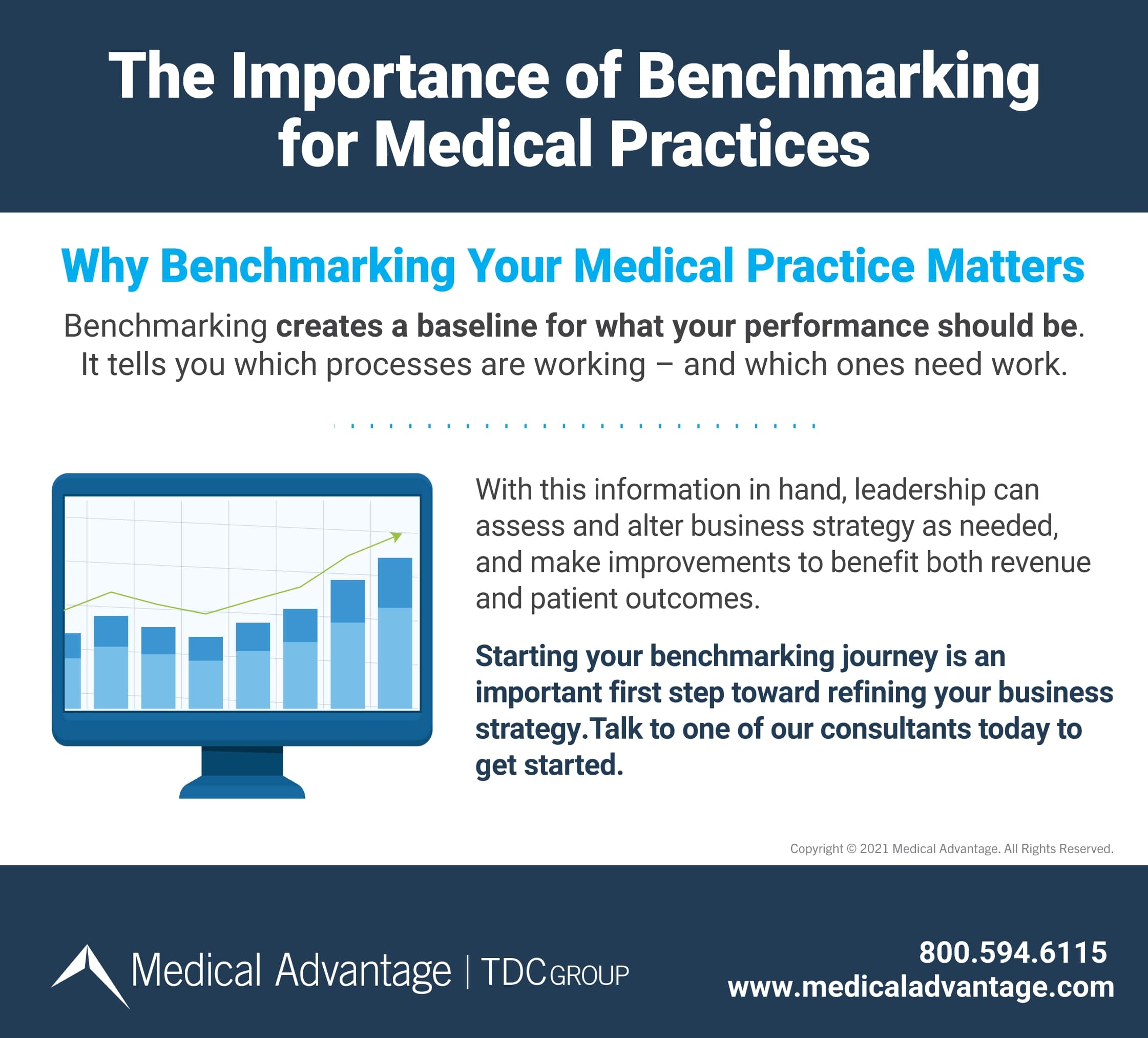What is Benchmarking For Medical Practices?
Why Benchmarking Your Medical Practice Matters
How to Identify Your KPI Benchmarks
Tracking Data with Medical Practice KPI Dashboards
Talk to a Healthcare Dashboards Expert Today
Technology has revolutionized the way we do business. Regardless of the industry, new software is making it easier for executives to view data on their organization’s performance, thus empowering these business leaders to make increasingly sound, data-based decisions and strategies by benchmarking their medical practice.
Healthcare is not immune to this revolution. With the advent of medical practice dashboards (also known as medical practice KPI dashboards), healthcare organizations now have a tool to assemble and view their performance data in one centralized, easy-to-operate place.
Thanks to medical practice KPI dashboards, benchmarking for medical practice operations has never been easier. But what exactly does benchmarking a medical practice mean? How do benchmarks for medical practices work, what insights do they provide, and how do they help professionals create a better business strategy for their healthcare organization? Read on to find out.
What is Benchmarking For Medical Practices?
The concept of benchmarking refers to comparing a certain organization’s products, services, and/or performance(s) against either external or internal competitors. By noting the measured differences in performance between two different entities, executives can begin to understand why one is outperforming the other – and then use those findings to inform business strategy that addresses the problem.
“The point of benchmarking,” according to e-commerce platform Shopify, “is to identify internal opportunities for improvement. By studying other companies with superior performance … and then comparing those processes to how your business operates, you can implement changes that will yield significant improvements.” This definition of benchmarking to healthcare organizations in terms of providers, locations, patient populations, or time periods.
For healthcare organizations, benchmarking is a powerful way to identify – and thus begin to correct – disparities in areas such as
- Patient outcomes,
- Contract performance,
- Population health metrics,
- Claim outcomes,
- Revenue and reimbursements.
Medical practice dashboards are a key part of this process – read on to find out how.
Why Benchmarking Your Medical Practice Matters
Benchmarking your medical practice is a crucial first step toward assessing strengths and weaknesses across different business aspects, measuring performance by certain Key Performance Indicators (KPIs), and making informed decisions about where and how to best allocate precious resources within your organization.
For healthcare organizations looking to grow their patient base or improve their performance in payer contracts, benchmarking with medical practice dashboards can provide vital insights into how your organization is performing per the associated KPIs. For example, multi-location organizations looking to grow their patient base can evaluate which of their locations receive the most and least visits – and can then dig deeper to see what each of these locations does differently.
As another example, organizations looking to improve performance in payer contracts can use benchmarking to track which of their providers is performing the best in a certain population health metric (take completion of Annual Wellness Visits, for example). By finding which physicians are delivering the best performance for this reimbursement-associated metric, executives can work to emulate those strategies across the board to improve population health – and thus improve reimbursements in payer contracts as well.
These are just a few examples of the power of benchmarking for medical practices. Benchmarking creates a baseline for what your performance should be. It tells you which processes are working – and which ones need work. By benchmarking across multiple locations, physicians, services, and time periods, your organization can begin to understand its strengths and weaknesses.
With this information in hand, leadership can assess and alter business strategy as needed, and make improvements to benefit both revenue and patient outcomes. But before any of this can happen, the right KPIs need to be benchmarked.

How to Identify Your KPI Benchmarks
Just as important as which business units you choose to compare are what KPIs you choose to benchmark. The good news is that, for almost all organizations, certain KPIs are going to be important – and these performance indicators are a great starting point: Patient Visit Metrics, Schedule Utilization Metrics, Population Health Metrics, and Billing and Coding Metrics. Nearly all healthcare organizations are going to want to keep an eye on these; as such, these KPIs are benchmark targets and serve as a template.
For a more in-depth look at some of the most popular healthcare KPIs to track, check out our detailed blog on the subject here: Watch These Healthcare Metrics to Improve Performance Results: 4 KPIs
That being said, there are also KPIs that may be more or less specific to a particular type of healthcare organization. For example, Federally Qualified Health Centers are one type of healthcare organization known for their specific reporting needs. FQHCs, as one example, may need to track benchmarking metrics important to Uniform Data System (UDS) reporting.
Other examples of healthcare organizations that might require more tailored KPIs for benchmarking include specialists, primary care providers, independent physicians, and more. Each of these organizations has its own special factors for success, and as such, may wish to add on more specific metrics to benchmark.
Tracking Data with Medical Practice KPI Dashboards
With an understanding of why benchmarking is important, and an idea of which KPIs must be tracked as context, it’s time to begin tracking data for benchmarking purposes. One of the best ways to do this is to leverage medical practice dashboards.
What are healthcare dashboards? Medical practice dashboards are software tools that allow you to view KPIs quickly and easily – all at the touch of a button, and without manual report assembly. Built for group practices, MSOs, and Private Equity firms, healthcare dashboards consolidate practice data into easy-to-use reports – allowing professionals to benchmark performance and capitalize on best practices.
For more information on healthcare dashboards, read our in-depth blog: Top 3 Benefits of Healthcare Analytics Dashboards
As our digitally-evolving healthcare environment continues to produce massive amounts of patient and practice performance data, making more effective use of it will result in tremendous benefits for all stakeholders. But before this can be done, it must be synthesized into an easy-to-understand, centralized, and visual solution. Healthcare analytics dashboards do precisely that, allowing healthcare professionals to benchmark areas for continued success – and act on those findings to gain improvement and growth.
Medical Advantage Can Help
Starting your benchmarking journey is a huge first step toward refining your business strategy – and you don’t need to take this journey alone. Medical Advantage’s expert healthcare IT consultants can help evaluate your KPI needs, and then implement healthcare dashboard solutions to help you track them. Talk to one of our consultants today to get started.







